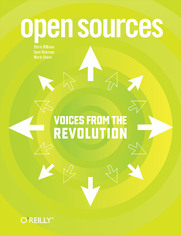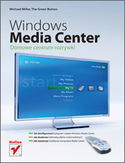Open Sources. Voices from the Open Source Revolution - Helion

ISBN: 978-05-965-5390-6
stron: 284, Format: ebook
Data wydania: 1999-01-03
Ksi─Ögarnia: Helion
Cena ksi─ů┼╝ki: 72,24 z┼é (poprzednio: 84,99 z┼é)
Oszczędzasz: 15% (-12,75 zł)
Freely available source code, with contributions from thousands of programmers around the world: this is the spirit of the software revolution known as Open Source. Open Source has grabbed the computer industry's attention. Netscape has opened the source code to Mozilla; IBM supports Apache; major database vendors haved ported their products to Linux. As enterprises realize the power of the open-source development model, Open Source is becoming a viable mainstream alternative to commercial software.Now in Open Sources, leaders of Open Source come together for the first time to discuss the new vision of the software industry they have created. The essays in this volume offer insight into how the Open Source movement works, why it succeeds, and where it is going.For programmers who have labored on open-source projects, Open Sources is the new gospel: a powerful vision from the movement's spiritual leaders. For businesses integrating open-source software into their enterprise, Open Sources reveals the mysteries of how open development builds better software, and how businesses can leverage freely available software for a competitive business advantage.The contributors here have been the leaders in the open-source arena:
- Brian Behlendorf (Apache)
- Kirk McKusick (Berkeley Unix)
- Tim O'Reilly (Publisher, O'Reilly & Associates)
- Bruce Perens (Debian Project, Open Source Initiative)
- Tom Paquin and Jim Hamerly (mozilla.org, Netscape)
- Eric Raymond (Open Source Initiative)
- Richard Stallman (GNU, Free Software Foundation, Emacs)
- Michael Tiemann (Cygnus Solutions)
- Linus Torvalds (Linux)
- Paul Vixie (Bind)
- Larry Wall (Perl)
Osoby które kupowały "Open Sources. Voices from the Open Source Revolution", wybierały także:
- Biologika Sukcesji Pokoleniowej. Sezon 3. Konflikty na terytorium 124,17 zł, (14,90 zł -88%)
- Windows Media Center. Domowe centrum rozrywki 66,67 zł, (8,00 zł -88%)
- Podręcznik startupu. Budowa wielkiej firmy krok po kroku 93,13 zł, (14,90 zł -84%)
- Ruby on Rails. ─ćwiczenia 18,75 z┼é, (3,00 z┼é -84%)
- Scrum. O zwinnym zarz 78,42 zł, (14,90 zł -81%)
Spis tre┼Ťci
Open Sources. Voices from the Open Source Revolution eBook -- spis tre┼Ťci
- Open Sources: Voices from the Open Source Revolution
- SPECIAL OFFER: Upgrade this ebook with OReilly
- 1. Acknowledgments
- 1. Introduction
- 1.1. Prologue
- 1.2. What Is Free Software and How Does It Relate to Open Source?
- 1.3. What Is Open Source Software?
- 1.4. The Dark Side of the Force
- 1.5. Use the Source, Luke
- 1.6. Innovation Through the Scientific Method
- 1.7. Perils to Open Source
- 1.8. Motivating the Open Source Hacker
- 1.9. The Venture and Investment Future of Linux
- 1.10. Science and the New Renaissance
- 2. A Brief History of Hackerdom
- 2.1. Prologue: The Real Programmers
- 2.2. The Early Hackers
- 2.3. The Rise of Unix
- 2.4. The End of Elder Days
- 2.5. The Proprietary Unix Era
- 2.6. The Early Free Unixes
- 2.7. The Great Web Explosion
- 3. Twenty Years of Berkeley Unix: From AT&T-Owned to Freely Redistributable
- 3.1. Early History
- 3.2. Early Distributions
- 3.3. VAX Unix
- 3.4. DARPA Support
- 3.5. 4.2BSD
- 3.6. 4.3BSD
- 3.7. Networking, Release 1
- 3.8. 4.3BSD-Reno
- 3.9. Networking, Release 2
- 3.10. The Lawsuit
- 3.11. 4.4BSD
- 3.12. 4.4BSD-Lite, Release 2
- 4. The Internet Engineering Task Force
- 4.1. The History of the IETF
- 4.2. IETF Structure and Features
- 4.3. IETF Working Groups
- 4.4. IETF Documents
- 4.5. The IETF Process
- 4.6. Open Standards, Open Documents, and Open Source
- 5. The GNU Operating System and the Free Software Movement
- 5.1. The First Software-Sharing Community
- 5.2. The Collapse of the Community
- 5.3. A Stark Moral Choice
- 5.4. Free as in Freedom
- 5.5. GNU Software and the GNU System
- 5.6. Commencing the Project
- 5.7. The First Steps
- 5.8. GNU Emacs
- 5.9. Is a Program Free for Every User?
- 5.10. Copyleft and the GNU GPL
- 5.11. The Free Software Foundation
- 5.12. Free Software Support
- 5.13. Technical Goals
- 5.14. Donated Computers
- 5.15. The GNU Task List
- 5.16. The GNU Library GPL
- 5.17. Scratching an Itch?
- 5.18. Unexpected Developments
- 5.19. The GNU HURD
- 5.20. Alix
- 5.21. Linux and GNU/Linux
- 5.22. Challenges in Our Future
- 5.22.1. Secret Hardware
- 5.22.2. Non-Free Libraries
- 5.22.3. Software Patents
- 5.22.4. Free Documentation
- 5.22.5. We Must Talk About Freedom
- 5.23. "Open Source"
- 5.24. Try!
- 6. Future of Cygnus Solutions: An Entrepreneurs Account
- 6.1. Cygnus in the Early Years
- 6.2. GNUPro
- 6.3. Challenges
- 6.4. Getting Funded Beyond Open SourceeCos
- 6.5. Reflections and Vision of the Future
- 7. Software Engineering
- 7.1. The Software Engineering Process
- 7.1.1. Marketing Requirements
- 7.1.2. System-Level Design
- 7.1.3. Detailed Design
- 7.1.4. Implementation
- 7.1.5. Integration
- 7.1.6. Field Testing
- 7.1.7. Support
- 7.2. Testing Details
- 7.2.1. Code Coverage Analysis
- 7.2.2. Regression Tests
- 7.3. Open Source Software Engineering
- 7.3.1. Marketing Requirements
- 7.3.2. System-Level Design
- 7.3.3. Detailed Design
- 7.3.4. Implementation
- 7.3.5. Integration
- 7.3.6. Field Testing
- 7.3.7. Support
- 7.4. Conclusions
- 7.1. The Software Engineering Process
- 8. The Linux Edge
- 8.1. Amiga and the Motorola Port
- 8.2. Microkernels
- 8.3. From Alpha to Portability
- 8.4. Kernel Space and User Space
- 8.5. GCC
- 8.6. Kernel Modules
- 8.7. Portability Today
- 8.8. The Future of Linux
- 9. Giving It Away: How Red Hat Software Stumbled Across a New Economic Model and Helped Improve an Industry
- 9.1. Where Did Red Hat Come From?
- 9.2. How Do You Make Money in Free Software?
- 9.3. We Are in the Commodity Product Business
- 9.4. The Strategic Appeal of This Model to the Corporate Computing Industry
- 9.5. Licensing, Open Source, or Free Software
- 9.6. The Economic Engine Behind Development of Open Source Software
- 9.7. Unique Benefits
- 9.8. The Great Unix Flaw
- 9.9. It's Your Choice
- 10. Diligence, Patience, and Humility
- 11. Open Source as a Business Strategy
- 11.1. It's All About Platforms
- 11.2. Analyzing Your Goals for an Open-Source Project
- 11.3. Evaluating the Market Need for Your Project
- 11.4. Open Source's Position in the Spectrum of Software
- 11.5. Nature Abhors a Vacuum
- 11.6. Donate, or Go It Alone?
- 11.7. Bootstrapping
- 11.8. What License to Use?
- 11.8.1. The BSD-Style Copyright
- 11.8.2. The Mozilla Public License
- 11.8.3. The GNU Public License
- 11.9. Tools for Launching Open Source Projects
- 12. The Open Source Definition
- 12.1. History
- 12.2. KDE, Qt, and Troll Tech
- 12.3. Analysis of the Open Source Definition
- 12.3.1. The Open Source Definition (Version 1.0)
- 12.4. Analysis of Licenses and Their Open Source Compliance
- 12.4.1. Public Domain
- 12.4.2. Free Software Licenses in General
- 12.4.3. The GNU General Public License
- 12.4.4. The GNU Library General Public License
- 12.4.5. The X, BSD, and Apache Licenses
- 12.4.6. The Artistic License
- 12.4.7. The Netscape Public License and the Mozilla Public License
- 12.5. Choosing a License
- 12.6. The Future
- 13. Hardware, Software, and Infoware
- 14. Freeing the Source: The Story of Mozilla
- 14.1. Making It Happen
- 14.2. Creating the License
- 14.3. Mozilla.org
- 14.4. Behind the Curtain
- 14.5. April Fool's Day, 1998
- 15. The Revenge of the Hackers
- 15.1. Beyond Brooks's Law
- 15.2. Memes and Mythmaking
- 15.3. The Road to Mountain View
- 15.4. The Origins of "Open Source"
- 15.5. The Accidental Revolutionary
- 15.6. Phases of the Campaign
- 15.7. The Facts on the Ground
- 15.8. Into the Future
- A. The Tanenbaum-Torvalds Debate
- B. The Open Source Definition, Version 1.0
- B.1. GNU General Public License
- B.1.1. Table of Contents
- B.1.2. GNU GENERAL PUBLIC LICENSE
- B.1.2.1. Preamble
- B.1.2.2. TERMS AND CONDITIONS FOR COPYING, DISTRIBUTION AND MODIFICATION
- B.1.2.3. How to Apply These Terms to Your New Programs
- B.1. GNU General Public License
- C. Contributors
- About the Authors
- SPECIAL OFFER: Upgrade this ebook with OReilly





